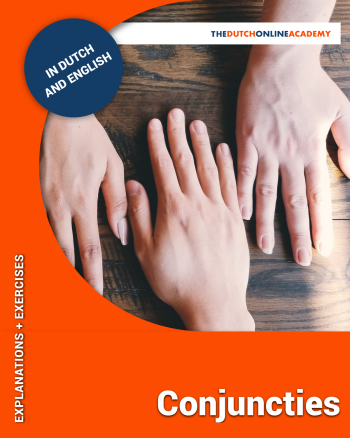Learn the theory
Conjunctions affect the word order. In the table below you will find the most important conjunctions with examples.
Main sentence + main sentence (normal word order): maar, en, of, want, dus (MEOW + D)
- Vandaag ben ik vrij, maar morgen moet ik werken.
- Het is koud en het waait hard.
- Vanavond ga ik koken of ik bestel een pizza. Ik weet het nog niet.
- Ik kan geen boodschappen doen, want de winkels zijn dicht.
- Het regent, dus blijf ik binnen.
Main sentence + clause (verbs come at the end of the clause): omdat, als, terwijl, hoewel, zodra, voordat, nadat, totdat, zodat, toen, mits, indien, tenzij.
- Ik moet naar school lopen, omdat mijn fiets kapot is.
- We gaan naar het strand, als het lekker weer is.
- Jij kookt, terwijl ik de was doe.
- Hij is gelukkig, hoewel hij niet rijk is.
- Het programma start automatisch, zodra u uw computer opstart.
- Je moet een examen doen, voordat je een diploma krijgt.
- Hij vertrekt naar Australië, nadat hij afscheid heeft genomen.
- We waren arm, tot(dat) mijn moeder een goede baan kreeg.
- Ik zet een wekker, zodat ik op tijd wakker word.
- Ik had geen mobiele telefoon, toen ik tien jaar oud was.
- Je mag deze film zien, mits je zestien jaar of ouder bent.
- Je kunt hier parkeren, indien je een vergunning hebt.
- Je mag deze film zien, tenzij je jonger bent dan zestien jaar.
Remember that you also use the subordinate clause (verbs go to the end) in indirect speech and the relative clause.
Want to work on your word order? Check our Word Order Course!
Practice with exercises
You can pick one of these conjunctions (don't use them twice): zodra, want, terwijl, hoewel, tenzij, sinds, maar, omdat, als, dus, toen
Choose the most logical option and remember that the word order can differ per conjunction.
comments
Login to leave a comment
info@thedutchonlineacademy.com
"Dus" offers great flexibility, this is all correct:
- Ik ben moe, dus ik ga nu naar bed.
- Ik ben moe, dus ga ik nu naar bed.
- Ik ben moe, dus nu ga ik naar bed.


![Learn Dutch with The double infinitive in Dutch [list of auxiliary verbs included]](https://images.ctfassets.net/f8l4gy5qxe00/7fpaN2iBE3h1xS7LRL8c0h/3bbebedc080cbf7eece73424c8e3918f/The_double_infinitive.png?w=350&h=495&q=50&fm=png)
